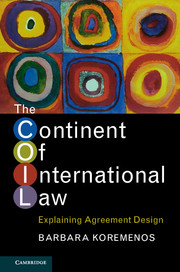Book contents
- Frontmatter
- Dedication
- Contents
- List of figures
- List of tables
- Acknowledgments
- 1 (Re)discovering the continent
- Part I COIL's building blocks: theory and data
- Part II Flexibility provisions in the design of international law
- Part III Centralization, scope, and control provisions in the design of international law
- Appendix 1 List of agreements in COIL sample
- Appendix 2 Coding rules
- Appendix 3 Selection issues in international cooperation data sets
- References
- Index
1 - (Re)discovering the continent
Published online by Cambridge University Press: 05 June 2016
- Frontmatter
- Dedication
- Contents
- List of figures
- List of tables
- Acknowledgments
- 1 (Re)discovering the continent
- Part I COIL's building blocks: theory and data
- Part II Flexibility provisions in the design of international law
- Part III Centralization, scope, and control provisions in the design of international law
- Appendix 1 List of agreements in COIL sample
- Appendix 2 Coding rules
- Appendix 3 Selection issues in international cooperation data sets
- References
- Index
Summary
Every year, states negotiate, conclude, sign, and give effect to hundreds of new international agreements. In 2013, 500 separate agreements officially entered into force; an additional 248 agreements were modified. All told, a substantial body of international law was enacted or changed to adapt to the evolving needs of international cooperation. Adding these new pieces of international law to the body of pre-existing agreements, the total number of international agreements and agreement updates now in force approaches 200,000.
These numbers will surprise many, as most international observers focus on just a small fraction of these agreements. Indeed, the media, the public, and even many international law and relations scholars pay heed to the largest agreements and the major international organizations they create, including the United Nations (UN), the European Union (EU), the International Monetary Fund (IMF), and the World Trade Organization (WTO). But these well-known agreements and their organizations are just the tip of the iceberg: Tens of thousands of agreements actually govern day-to-day international cooperation. All of this law is developed to address the significant problems plaguing the international realm, problems that transcend national borders and whose solutions require joint action by states. The subject matter of all of this law ranges from the most important security issues, like nuclear weapons, to human rights to environmental problems to diverse economic issues – essentially to nearly every facet of international life.
What's more, the success of these tens of thousands of cooperative agreements depends not only on their substantive provisions; their design/procedural provisions matter, too. When chosen correctly, the detailed institutional design provisions of international law help states confront harsh international political realities, thereby increasing the incidence and robustness of international cooperation in each of these subject matters. The study of these institutional provisions and why and how they matter is the subject of the Continent of International Law (COIL) research program.
This book maps the vast and shrewd variation in international law with respect to design provisions, including those for duration, monitoring, punishment, escape, and withdrawal, and ultimately shows its order. While international law develops under anarchy, states design this body of law rationally, in ways that make sense only if they are seeking to solve their joint problems and to stabilize these solutions. They do not neglect its details as they would if law did not matter in their calculus.
- Type
- Chapter
- Information
- The Continent of International LawExplaining Agreement Design, pp. 1 - 22Publisher: Cambridge University PressPrint publication year: 2016



